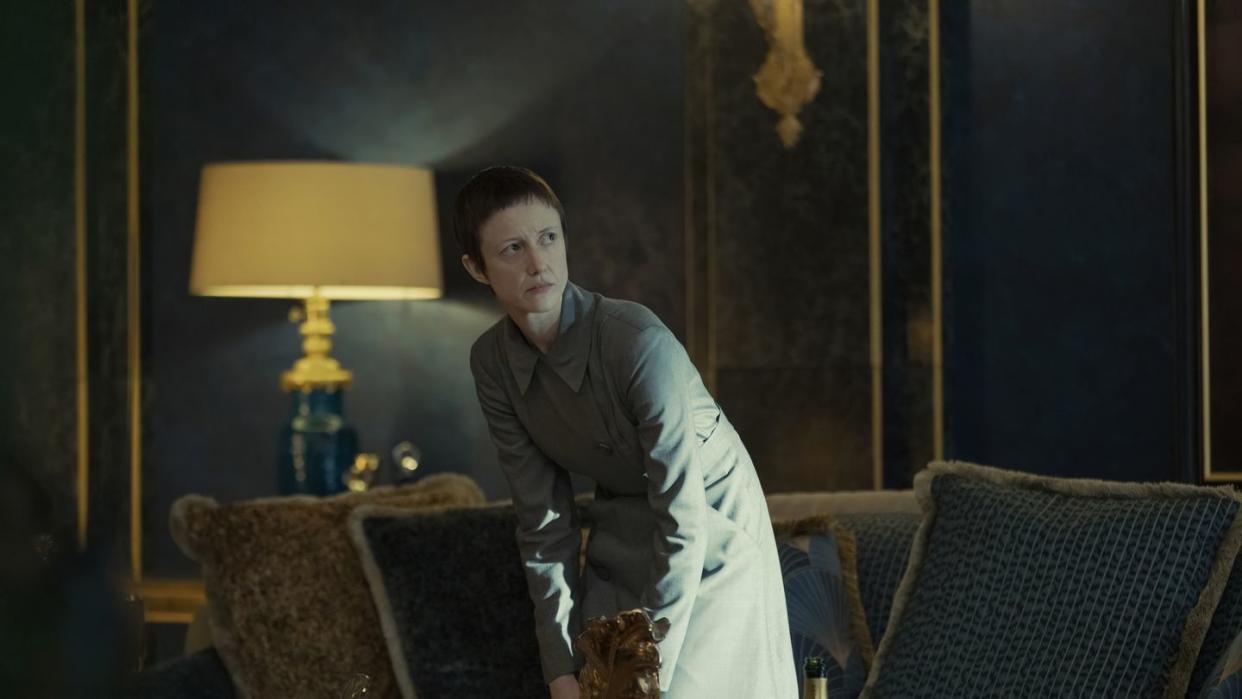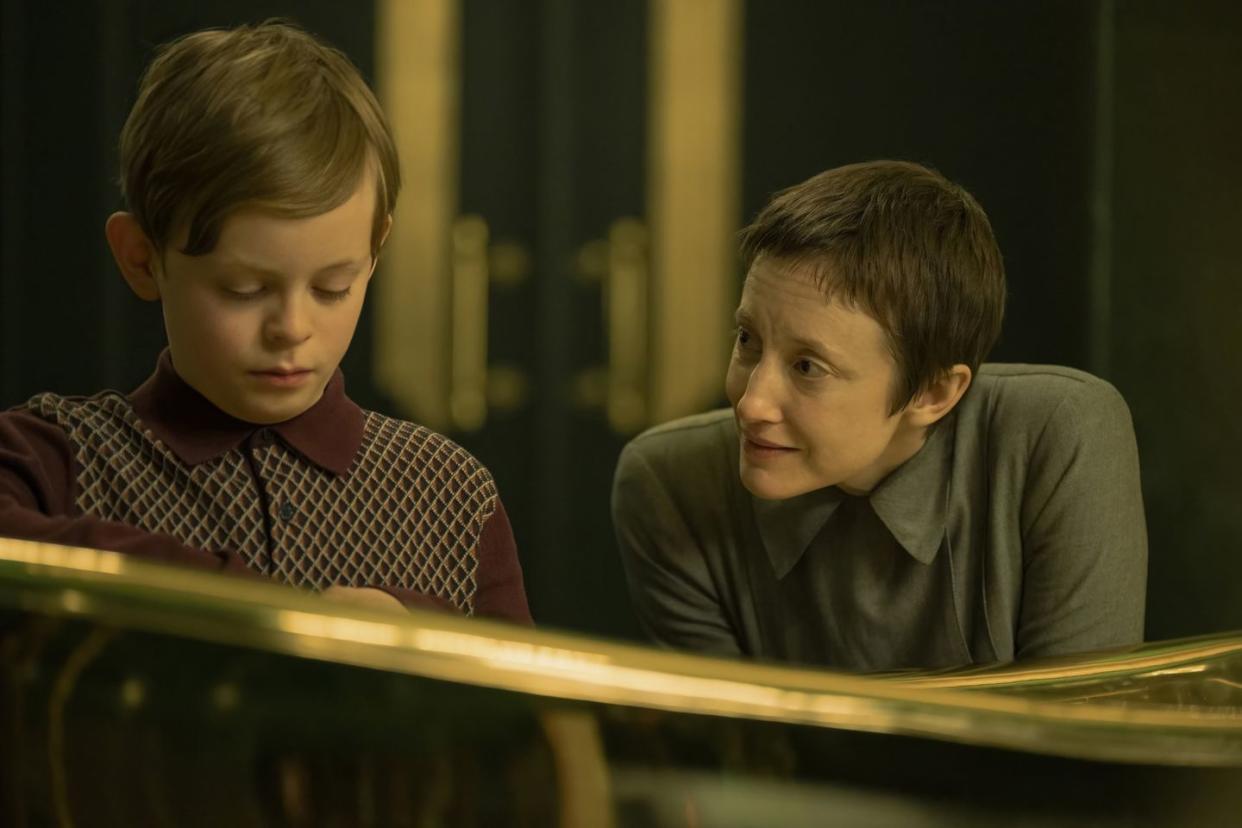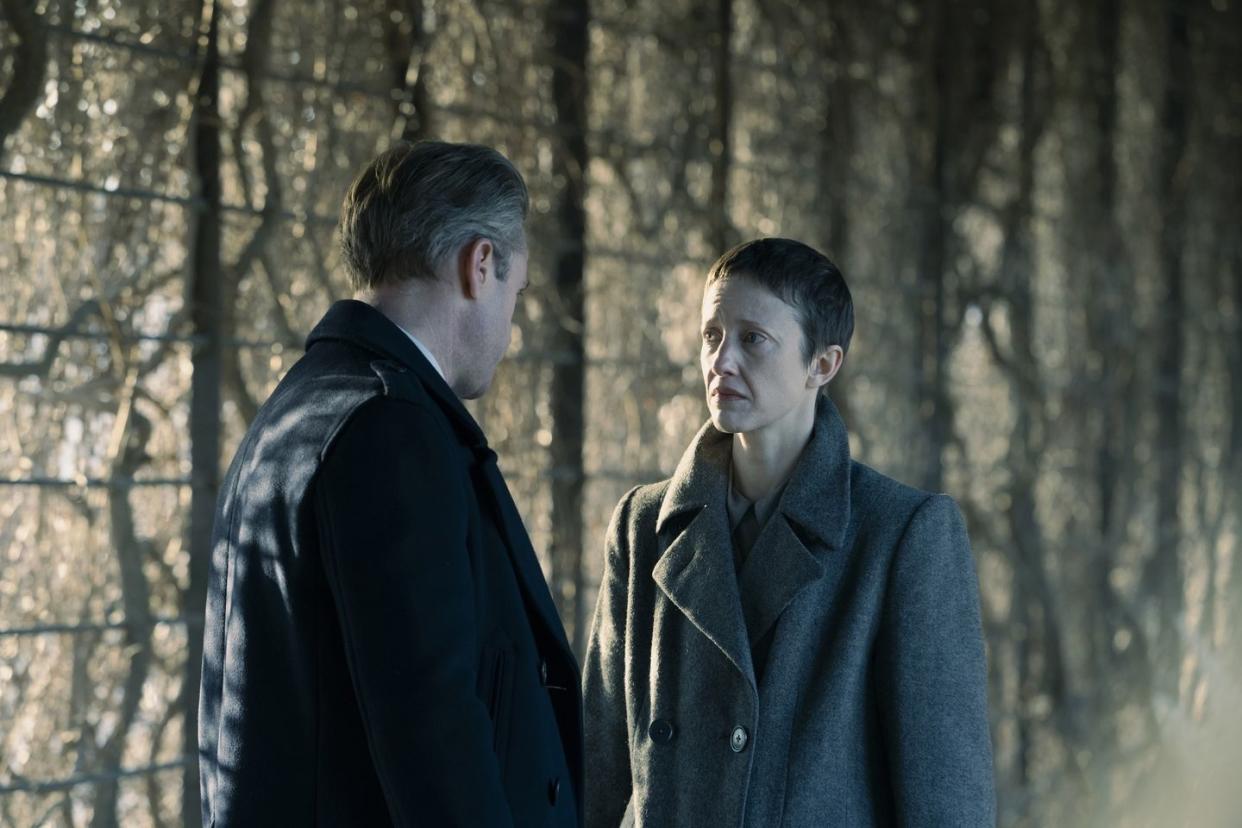Andrea Riseborough on Agnes’ ‘Beautifully and Realistically Cruel’ Story in ‘The Regime’

Spoilers below.
HBO’s limited series The Regime might focus on Kate Winslet’s Elena Vernham, the absurd chancellor of a fictional European country, but the most fascinating perspectives are those of the people around her, who are subject to or feed into her delusions. This is especially the case with Agnes (Andrea Riseborough), her trusted right-hand woman, who somehow keeps the palace running smoothly while seeing right through her boss’s absurdity. Though, she doesn’t have much of a choice. Agnes’ young son, Oskar, has been favored by Elena so much that she pretends to be his mother, and Agnes can’t afford to run away for a better life, even though she’s been tempted with an escape route in exchange for insider information. Finally, in episode 5, she decides to make a run for Paris with her boy, but, in a tragic case of irony, the palace is stormed by Elena’s furious constituents, and things turn violent. Agnes meets her demise in the chaos, and we assume Oskar never makes it out alive either.
“It’s the end of the story that probably won’t be told like many, many other stories that weren’t told of people who came into this world and left little behind,” the Oscar-nominated Riseborough tells ELLE.com. “Whereas those figures like Elena will forever be ogled over and obsessed about and reflected upon, and there’ll always be a sort of endless fascination.”
While playing Agnes and filming in Vienna’s Schönbrunn Palace, Riseborough thought a lot about her grandmothers. These women who raised her worked as servants in other people’s homes, did manual labor, worked in a factory, sold tickets at the cinema during World War II, and were cleaners. “I felt quite close to both my grandmas when we were shooting,” she says. She remembered their industrious work ethic, which she found in her character as well.
“My one grandma, who I thought of a lot, her last job was a cleaner, but she never sat down, and she never stopped cleaning,” Riseborough says, noting the nearly comedic aspect to the never-ending work. “For Agnes, that becomes ridiculous in this series to the point where she’s stick-thin, she never sits down, she never has a moment to herself, and her child’s stolen.”
Despite the harrowing subject matter, Riseborough fondly recalls a “real sense of camaraderie” among director Stephen Frears, showrunner Will Tracy, Winslet, director Jessica Hobbs, co-star Matthias Schoenaerts, and the cast and crew behind the scenes. Perhaps that was necessary to stay balanced amid such serious work. “If I could go to work every day with Kate, that would be a dream for the rest of my life, really,” she says.
On a sunny Friday in L.A., Riseborough walked us through Agnes’ final moments onscreen.
Agnes sees through Elena’s absurdities but also knows how to keep her household afloat. How did you build this character?
I’d been attached to it for quite some months before we started to go into pre-production, and her background wasn’t entirely clear, which served its own purpose in the piece in the beginning. I suggested to Will that perhaps she should really represent the proletariat, or would it be interesting if she were the voice of the working people whose lives are being affected by these decision-makers who had absolutely no relationship to the lives of the people for which they were making decisions? To have somebody like that who is, I wouldn’t say totally sane but, at least adjacent to sanity in the palace turned out to be really a valuable tool, because through her, you get to enjoy the long-suffering ridiculousness and exasperation, and through her, you feel the terror of the regime and the fallout of dictatorship.
I really, really enjoyed her physicality. I wanted her to be able to turn on a dime at any moment, because she has to be so malleable, which sometimes is quite comical. It almost felt quite vaudevillian in a way. I was always pulling an air purifier into a room or pushing a stack of potatoes out of a room.
She really is a long-suffering character, and objectively, it is quite funny the things she has to do, but, at the center of it, she’s horribly trapped in an impossibly choiceless situation where she’s not able to operate with the same kind of moral constraints that we might in a nation where we believe that we’re free. It’s like a life-or-death situation for her. She’s always thinking about Oskar and his preservation, and unfortunately, he’s been found in favor [by Elena].

How would you even begin to describe her and Elena’s relationship? Obviously, the power dynamic is very imbalanced.
I suppose the question is: How do you co-parent with a dictator? And there are many people living today who would probably be able to answer that question.
But as time kicks along for Agnes, the deep-seated resentment and hatred of this kind of usurpation of her own motherhood just grows and grows and grows and grows, but Agnes’ only real freedom is the one that she shares with the audience. Because in those moments where nobody’s looking, she’s able to roll her eyes or breathe out in a way that is unseen to the rest of the room. And she picks those moments very sparingly and carefully, because she’s in real danger, and they’re all constantly in real danger. But I thought that their relationship was so interesting.
Kate and I had talked before we shot this when we were shooting Lee: I had very short hair. I had just played a character who’d gone through chemotherapy in a French film, and so my hair was just about grown back, and Kate and I just touched on the idea that it might be a request of Elena’s that Agnes keep her hair short, almost because of her own insecurities about her exterior and how castrating that would be.
Hair means something different to every human. To one person, something short might mean freedom, and something long might mean feeling trapped, and to another, something completely different. But for Agnes, it felt a little like her femininity had been stripped from her in a sense.
Episode 5 is a pressure cooker, and then the lid blows off by the end. It is very physical in a way—there’s a lot of movement and things going on. What was it like filming the storming of the palace?
This is just really boring technical talk, but when you begin to set up a shot or the sequence has been structured, and there are many, many movable parts and many supporting artists and a lot of coordination and potentially dangerous things, like things blowing up or burning, or lots of things to think about in the workplace, it takes a long time. It’s almost like coordinating a dance. It takes a long time to map that out in order to then be able to forget it and have complete freedom. And then when the freedom comes, the only thing that Agnes was thinking of was Oskar. There wasn’t room for anything other than: “I’m getting to him. Where is he? I must find him. I think I know.” It was just Oskar, and then without any thought or ceremony, certainly no fanfare, life ends for her, just like that.
In the midst of that thought of his preservation, her existence is taken from us. It’s so beautifully and realistically cruel, because unfortunately, it just represents the way that the working people are manipulated like pawns, and their lives fall to the wayside, and they’re rarely remembered still. If you go to a history book now, it’s always difficult to really find out what the laymen thought in the situation, but not so hard to find out what Charles I thought.
What is it, “history is written by the victors”? But we’d love to hear the other perspectives as well.
It’s vital to hear all of the perspectives. It’s vital, or we will only make the mistakes over and over and over again.

There was a tragic irony at the end of Agnes’ storyline. In the episodes leading up, it took a lot of convincing for her to finally decide, okay, I will escape with my son. And then finally, when she does somehow work her way out, it doesn’t happen.
Yes, unfortunately, she’s not operating from a place of having choice. At first, escape means death, because that’s the consequence of an escape gone wrong. And then there’s a turning point where it begins to mean survival, but it’s not guaranteed survival. And as you see everything crumbling in the palace and in Elena’s world, escape becomes an absolute necessity. But as I said, the survival is never a given. It’s only the lesser of two evils. So it’s not like a choice is laid out in front of them or anything.
There’s a risk.
All she’s thinking about is his survival. I think her own survival, probably after his birth, has just long been forgotten, really.
I’m curious if working on this project altered how you view modern politics or the way we look at leaders.
I’ve always been really politically engaged. Since I’ve been a little kid, it’s always been something I’ve been really, really interested in and engaged with. But I think that what’s wonderful is when you’re able to be part of something that is beyond satire but deeply political, steeped in politics, all of those things. All of those things that you have felt or found so ridiculous or so hopeless about, it’s wonderful to have them brought to light from somebody else’s perspective. Seeing them from Will [Tracy, the showrunner]’s perspective all succinctly and concisely put down in this wonderful stack of pages was like a feast.
I suppose what it made us all think about is the terror of being in a pressure cooker like that, the terror of living day to day in that kind of heightened political situation where you’re so close to the dragon, the dragon being Elena, and really nobody’s firing on all cylinders or any productive cylinders whatsoever. It’s just coming from a place of transparent terror and utter survival and nothing more.
But you actually get to see quite a lot of Agnes’ courage in the way that she’s trying. She’s displaying good parts of herself, as well as being completely complicit in this terrible situation.
This interview has been edited and condensed.
You Might Also Like
